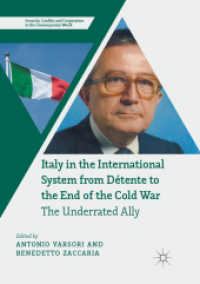- ホーム
- > 洋書
- > 英文書
- > History / World
Full Description
This book explores aspects of the social and cultural history of nuclear Britain in the Cold War era (1945-1991) and contributes to a more multivalent exploration of the consequences of nuclear choices which are too often left unacknowledged by historians of post-war Britain.
In the years after 1945, the British government mobilised money, scientific knowledge, people and military-industrial capacity to create both an independent nuclear deterrent and the generation of electricity through nuclear reactors. This expensive and vast 'technopolitical' project, mostly top-secret and run by small sub-committees within government, was central to broader Cold War strategy and policy. Recent attempts to map the resulting social and cultural history of these military-industrial policy decisions suggest that nuclear mobilisation had far-reaching consequences for British life.
The chapters in this book were originally published as a special issue of Contemporary British History.
Contents
Introduction: social and cultural histories of British nuclear mobilisation since 1945
Jonathan Hogg and Kate Brown
1. Mass observing the atom bomb: the emotional politics of August 1945
Claire Langhamer
2. '...what in the hell's this?' Rehearsing nuclear war in Britain's Civil Defence Corps
Jessica Douthwaite
3. 'Nuclear Prospects': the siting and construction of Sizewell A power station 1957-1966
Christine Wall
4. Weaponising peace: the Greater London Council, cultural policy, and 'GLC Peace Year 1983'
Hazel Atashroo
5. Resist and survive: Welsh protests and the British nuclear state in the 1980s
Christophe Laucht and Martin Johnes
6. Britain, West Africa and 'The new nuclear imperialism': decolonisation and development during French tests
Christopher Robert Hill








